The Future of Thalis in Indian Households: Plastic or Stainless Steel?

A. Brief history of Thalis in India
Thalis, also known as plates or platters, have been a staple in Indian households for centuries. Eating healthy food and providing healthy food to the family has always been the priority for every parent, but many times they ignore the fact that while giving them healthy food they might be serving an unhealthy plate which can cause health problems. With the advent of modern materials and manufacturing techniques, Thalis made of Stainless Steel and Plastic have become increasingly popular in Indian households.
B. Purpose of the blog
The purpose of the blog is to discuss the future of Thalis in Indian households, with a focus on the pros and cons of using Plastic Thalis versus Stainless Steel Thalis. The blog will explore the advantages and disadvantages of each material and make predictions about the future of Thalis in Indian households based on trends and advancements in the field.
Advantages and disadvantages of Stainless Steel Thali:
Advantages of Stainless Steel Thalis include:
- Durability: Stainless Steel Thalis are known for their durability and resistance to wear and tear, making them a long-lasting choice for households. They are resistant to cracks, stains, and warping, and can withstand repeated use and exposure to heat and moisture.
- Food safety: Stainless Steel is a non-reactive material and does not leach chemicals into food, making it a safe and hygienic choice for food preparation and consumption.
- Easy to clean: Stainless Steel is easy to clean and maintain, and is resistant to bacteria, mold, and other forms of contamination. This makes it a good choice for households that place a high emphasis on hygiene.
- Sustainable: Stainless Steel is a recyclable material and the production of Stainless Steel Thalis does not contribute to environmental pollution.
- Aesthetics: Stainless Steel Thalis have a sleek, modern appearance that is versatile and suitable for a range of styles and decor.
- Versatility: Stainless Steel Thalis are suitable for a wide range of purposes, from everyday use to special occasions. They can be used for serving food, as well as for cooking and reheating food in the oven or microwave.
Disadvantages of Stainless Steel Thalis
- Higher cost: Stainless Steel Thalis are mostly costlier compared to Plastic Thalis, but they are also a good long term investment, as once you buy Thali they are perfectly fine and have the same shine for more than a decade. So, higher cost might be a disadvantage but we can also say that they are cost effective and worth the cost.
Advantages and disadvantages of Plastic Thali:
Advantages of Plastic Thalis include:
- Cost-effective: Plastic Thalis are relatively inexpensive compared to other materials, making them a popular choice among households on a budget.
- Lightweight: Plastic Thalis are lightweight and easy to handle, making them a convenient choice for households with young children or elderly members.
- Variety in design and color: Plastic Thalis come in a wide range of designs, colors, and patterns, making it easy for households to choose a style that matches their aesthetic.
- Unbreakable: Plastic Thalis are less likely to break or chip compared to Thalis made of glass or ceramic, making them a good choice for households that are prone to spills and accidents.
Disadvantages of Plastic Thalis include:
- Environmental impact: Plastic Thalis are not biodegradable and can take hundreds of years to break down in landfills, contributing to environmental pollution. Plastic waste is a growing problem worldwide, and the use of Plastic Thalis contributes to this issue.
- Leaching of chemicals into food: Plastic can leach harmful chemicals into food, potentially compromising food safety and health. Some types of Plastic contain chemicals like Bisphenol A (BPA) that can cause health-related problems.
- Limited durability: Plastic Thalis are prone to cracking, staining, and warping and are not as long-lasting as Thalis made of other materials. They can also become brittle and crack with repeated use, exposure to heat, and sunlight.
- Lack of Recyclability: Many Plastic Thalis are not recyclable, meaning they cannot be repurposed and end up in landfills, oceans, or the natural environment. This contributes to the growing problem of Plastic waste.
- Harmful for Health: Using Plastic Thalis for the long term can have harmful effects on health as Plastic is known to release toxic chemicals into food, especially when exposed to heat or sunlight. Thus, to stay healthy & safe, choose a healthy option.
- Unsustainable: Plastic is a non-renewable resource, and the production of Plastic Thalis requires energy and resources that are not sustainable in the long term.
FAQs
What are the advantages of Plastic Thalis?
The advantages of Plastic Thalis include being cost-effective, lightweight, available in a variety of designs and colors, and unbreakable.
What are the disadvantages of Plastic Thalis?
The disadvantages of Plastic Thalis include having a negative impact on the environment, leaching chemicals into food, limited durability, lack of recyclability, harmful to health, and being unsustainable.
What are the advantages of Stainless Steel Thalis?
The advantages of Stainless Steel Thalis include being durable, safe for food, easy to clean, sustainable, aesthetically pleasing, and versatile.
Are Plastic Thalis safe for food?
Some Plastic Thalis can be unsafe for food as they may leach chemicals into food, especially when exposed to high temperatures or acidic substances.
Are Stainless Steel Thalis environmentally friendly?
Yes, Stainless Steel Thalis are considered environmentally friendly as they are durable, easy to recycle, and do not leach harmful chemicals into the environment or food.
Which is better for health, Plastic or Stainless Steel Thalis?
Stainless Steel Thalis are considered safer for health as they do not leach chemicals into food, unlike Plastic Thalis.
What is the future of Thalis in Indian households?
The future of Thalis in Indian households is moving towards more sustainable and safe options, such as Stainless Steel Thalis, as consumers become more aware of the impact of their choices on the environment and personal health.
Is Stainless Steel Thali safe for food?
Yes, a Stainless Steel Thali is considered safe for food as it does not leach harmful chemicals into food, unlike some Plastic Thalis.
How long does a Stainless Steel Thali last?
A Stainless Steel Thali can last for several years if well maintained, making it a long-term and cost-effective choice.
In summary, the choice between Plastic and Stainless Steel Thalis for Indian households is an important one that has implications for both the environment and personal health. While Plastic Thalis are cost-effective, lightweight, and come in a variety of designs and colors, they also have significant disadvantages such as leaching chemicals into food, limited durability, and a lack of recyclability. With consumers becoming increasingly aware of the impact of their choices on the environment, the trend is moving towards more sustainable and safe options.
In conclusion, the future of Thalis in Indian households is one that values sustainability, safety, and practicality. By making conscious choices, households can play a role in shaping the future of Thalis and help create a more responsible and sustainable world.
Also Choosing a Stainless Steel Thali from VINOD Stainless Steel is a smart choice for several reasons. Firstly, Stainless Steel is a safe material for food, as it does not leach harmful chemicals into the food. This ensures that you and your family can enjoy healthy and safe meals. Secondly, Stainless Steel is durable and long-lasting, making it a cost-effective choice. Thirdly, Stainless Steel is easy to clean and maintain, which is an important consideration in a busy household. Fourthly, VINOD Stainless Steel has a wide range of Thalis & Thalis sets, once can choose according to their needs and preferences. They have different sizes available suitable for all your needs. Lastly, VINOD Stainless Steel is a trusted brand in the industry, offering high-quality and reliable products. In conclusion, choosing a Stainless Steel Thali from VINOD Stainless Steel is a wise investment for your household that provides both practical and aesthetic benefits.
| Product Name | Set of Pieces | Price | ||
|---|---|---|---|---|
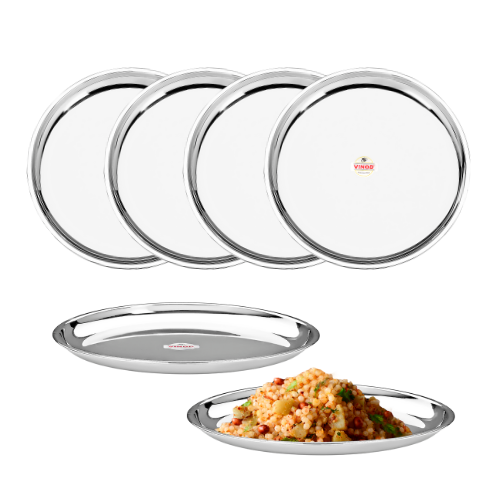 |
Vinod Stainless Steel China Dish | 6 | Rs.633.00 | Buy Now |
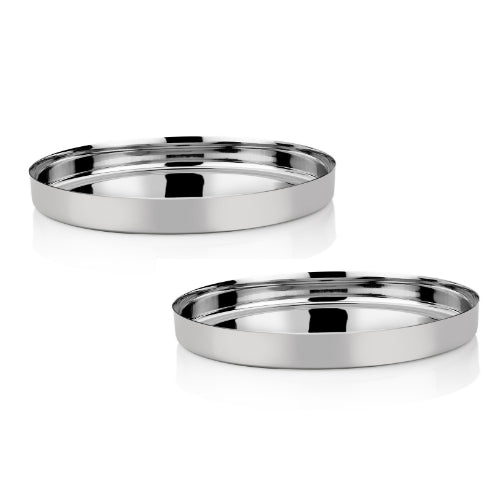 |
Vinod Stainless Steel Khumcha Thali | 2 | Rs.936.00 | Buy Now |
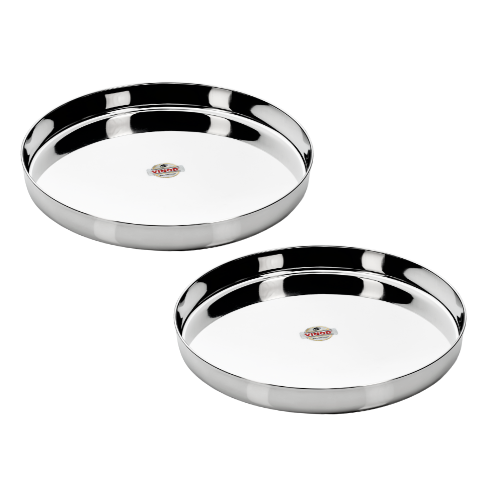 |
Vinod Stainless Steel Beeding Khumcha Thali set | 2 | Rs.951.00 | Buy Now |
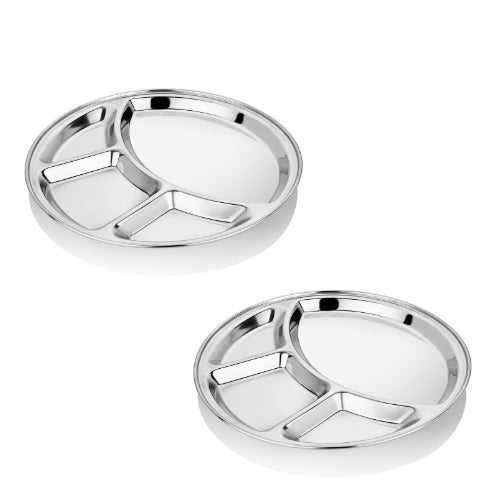 |
Vinod Stainless Steel Bhojan Thali | 2 | Rs.968.00 | Buy Now |
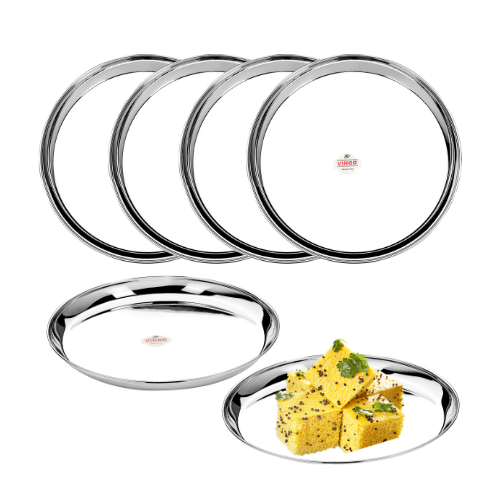 |
Vinod Stainless Steel Kanchan Bogi | 6 | Rs.1 034.00 | Buy Now |
 |
Vinod Stainless Steel Rajbhog Dish – Salad Plate | 6 | Rs.1 034.00 | Buy Now |
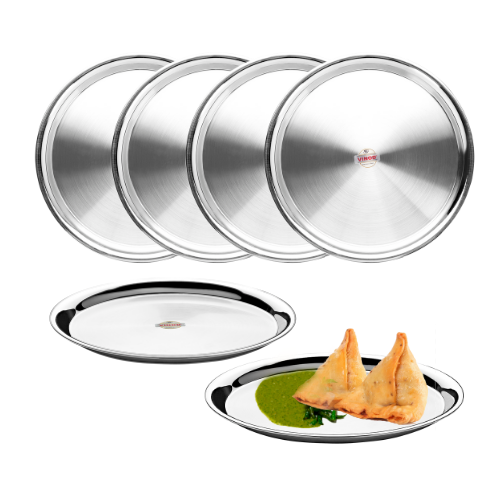 |
Vinod Stainless Steel Two Tone German Bogi Dish | 6 | Rs.1 136.00 | Buy Now |
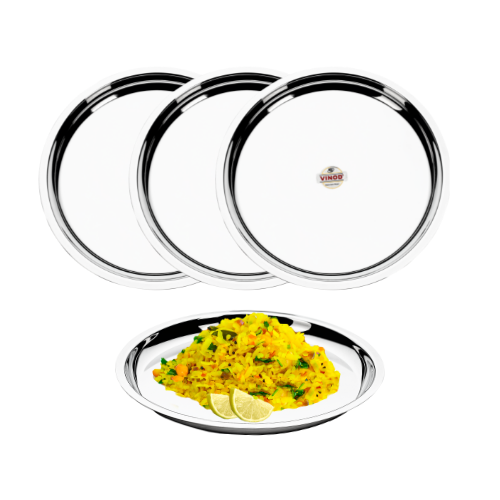 |
Vinod Stainless Steel New Tat | 4 | Rs.1 356.00 | Buy Now |
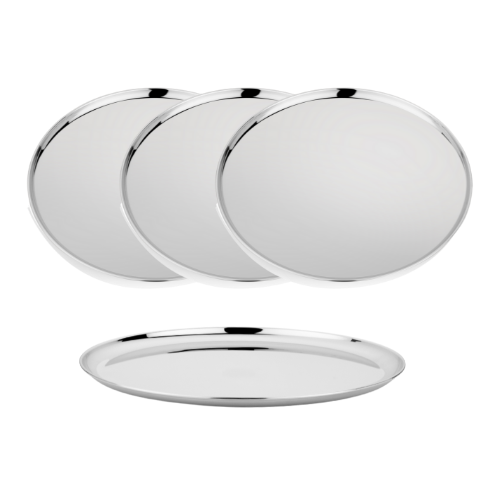 |
Vinod Stainless Steel Bangla Bogi Plate | 4 | Rs.1 424.00 | Buy Now |
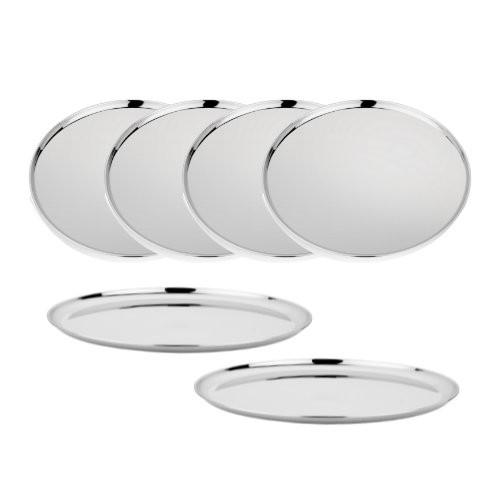 |
Vinod Stainless Steel Two Tone Dish | 6 | Rs.1 575.00 | Buy Now |















